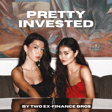
Confessions of a Finance girly - Hedge Funds, IB, VC, Investor Relations - what’s the difference?
On this episode, Eleanor interviews Pritika Tiwari, a finance queen, who has first-hand experience in multiple finance roles (former Investment Banker, data researcher at a Hedge Fund, Venture Capital Investor) and now Investor Relations for an Opportunistic Credit Fund.
They speak honestly about choosing what even within Finance is the right opportunity for you. Buy-side vs. sell-side? And Pritika shares how to keep calm even in high pressure environments - hint: meditation.
You can find us on YouTube, TikTok, and Instagram at:
https://www.youtube.com/@PrettyInvestedMedia
https://www.tiktok.com/@prettyinvestedmedia
https://www.instagram.com/prettyinvestedmedia
Pretty Invested Media and this related information does not constitute professional or financial advice of any kind (including business, employment, investment advisory, accounting, tax, and/or legal advice). Advice from a suitably qualified professional should always be sought in relation to any particular matter or circumstance.





